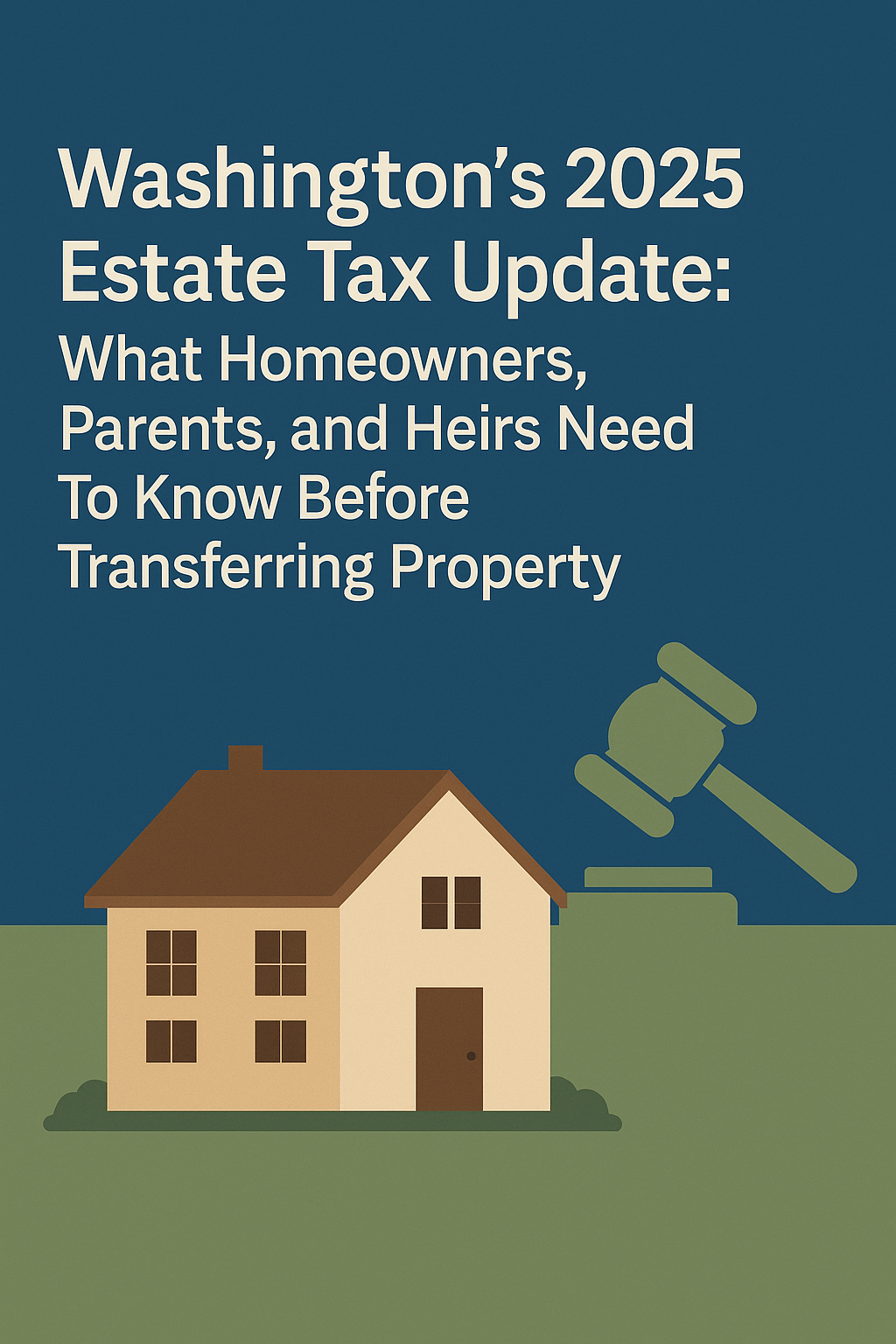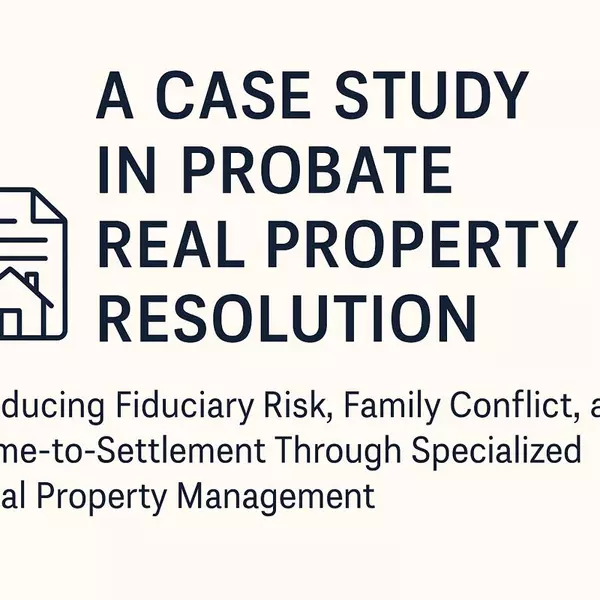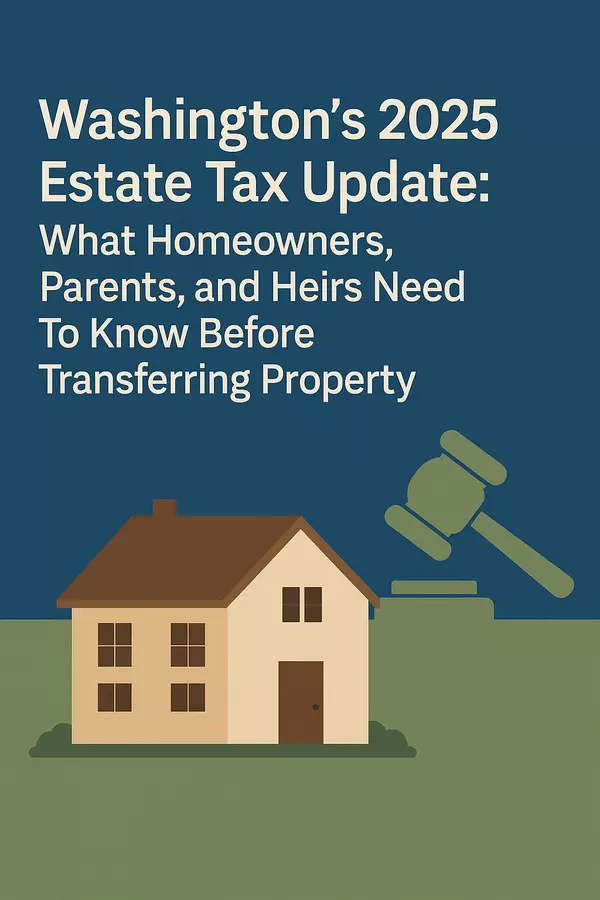Washington’s 2025 Estate Tax Update: What Homeowners, Parents, and Heirs Need To Know Before Transferring Property by Austin Robertson Probate Specialist Real Estate Agent Tacoma Washington

Washington State quietly made an important change going into 2025, and it affects anyone who owns a home, rental property, or investment real estate that will eventually be passed down to a family member. The Department of Revenue updated its estate tax reporting guidance, and while the update is not loud or dramatic, its impact is real. The rules now apply more pressure on families to get property valuations right, especially for estates that exceed the two point one nine three million dollar exemption.
This article will break down what changed, why it matters, how it affects homeowners and heirs, and what you can do now to avoid unnecessary tax burdens or complications. Whether you own property, care for aging parents, or expect to inherit a home someday, this information will help you prepare and protect your family.
Understanding Washington’s Estate Tax Structure
Unlike most states, Washington has its own estate tax in addition to the federal estate tax. The current Washington exemption is two point one nine three million dollars. Anything above that is subject to the state estate tax. Many families assume they are nowhere near that threshold, but real estate values in Pierce County and the South Sound region have risen faster than most people realize. When you combine the family home, inherited property, land, investments, and life insurance, estates can pass that threshold more easily than expected.
This is why accurate valuations matter. An estate that is reported incorrectly may be taxed incorrectly. The updated guidance from the Department of Revenue focuses specifically on how families are determining real property values.
What Changed in 2025
The state has strengthened its expectations around real estate valuations. The issue in recent years has been inconsistent valuation practices and undervalued homes. To address that, the state now encourages more formal appraisals instead of informal estimates. They are reviewing valuations more carefully and looking closely at estates that include inherited rentals or investment properties.
If a family undervalues a home in the estate paperwork, the state may challenge the valuation and request supporting documentation. The new guidance also clarifies what is required when property is transferred through revocable or irrevocable trusts. Trusts do not avoid the Washington State estate tax, but they do help minimize probate complications. For that benefit to apply, documentation needs to be complete, consistent, and aligned with the new appraisal expectations.
These updates do not mean the rules are harder. They simply make the expectations clearer. Families now have a more defined roadmap for how to prepare.
Why Washington Is Focusing On Real Estate Valuations
Real property is often the largest asset in an estate. It is also one of the easiest to undervalue if the valuation is not handled properly. The state has seen cases where families used informal estimates, Zillow numbers, outdated comparables, or personal opinions to estimate property values. Those practices can lead to incorrect estate tax filings.
Washington is not trying to penalize families. The goal is accuracy. Accurate valuations help determine whether the estate crosses the exemption threshold. They also shape future tax events, especially if the property is later sold.
The Step Up in Basis and Why It Matters
The step up in basis is one of the most misunderstood parts of estate planning. When someone inherits property, the value of that property for tax purposes resets to the fair market value at the time of death. This protects the heir from paying capital gains on appreciation that happened before they inherited the home.
However, if the valuation used at the time of death is incorrect, the step up is incorrect. This can create unnecessary capital gains tax when the property is sold. Many families discover this mistake years later when the heir tries to sell the inherited home and ends up owing more tax than they should have.
This is why the state now encourages professional appraisals. When the valuation is solid and supported by formal documentation, the step up is accurate and the heir is protected.
Who This Affects Most
While these changes apply statewide, several groups should pay especially close attention.
Families with aging parents
Anyone who expects to inherit or pass down property should prepare early. Planning ahead reduces stress and avoids rushed decisions during a difficult time.
Homeowners with high value property
Many Pierce County homes now sit in the seven hundred thousand to one point five million dollar range. When combined with other assets, the estate can cross the exemption threshold without the family realizing it.
Owners of rental properties
The state is watching inherited rentals more closely. The difference between an informal estimate and a professional appraisal could be tens or hundreds of thousands of dollars.
Families using trusts
Trusts help avoid probate but they do not avoid the estate tax. For a trust to work properly, it must include documentation aligned with the updated expectations.
Executors or personal representatives
If you are responsible for settling an estate, this guidance directly affects your timeline, risk, and responsibilities.
Why A Professional Appraisal Is Becoming Essential
A professional appraisal achieves two things. It protects the estate from unnecessary tax exposure and it protects heirs from future capital gains problems. Appraisers evaluate the home based on real comparable sales, local market data, and the condition of the property at the time of death. This level of detail offers clarity and ensures that both the estate tax filing and the step up in basis are accurate.
There are families who skip this step because they think it is only necessary for luxury estates. The truth is that middle class families are the ones most at risk of accidental tax consequences. A solid valuation is a low cost investment that prevents costly outcomes later.
How To Prepare If Your Family Plans To Transfer Property
The best time to prepare is before the estate is created or transferred. Here are steps that help simplify the process.
Review your current property values
Even if you do not plan to transfer a home soon, understanding its current market value helps you plan ahead.
Consider a professional appraisal
This protects heirs and creates a clear valuation record.
Review your trust documents
If you have a revocable or irrevocable trust, make sure it includes properly documented real estate information.
Talk to your family
Transparency avoids misunderstandings and ensures everyone understands the estate plan.
Consult an attorney or tax professional
Estate planning laws are specific to Washington. Speaking with a qualified professional ensures accuracy.
The Bottom Line
Washington’s updated estate tax guidance is not meant to complicate your life. It is meant to provide clarity and prevent costly mistakes. If your family owns property or plans to pass property down, now is an ideal time to review how it is valued and documented. The difference between an informal estimate and a professional appraisal can have a major impact on your family’s financial future.
Sources:
https://dor.wa.gov/taxes-rates/estate-tax
https://dor.wa.gov/forms-publications/forms/estate-tax-forms
Categories
Recent Posts










